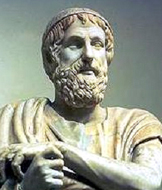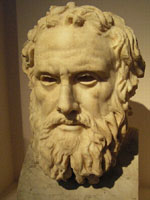![]()
![]()
Ancient Philosophy
Forerunners of Ancient Philosophical Cosmogony and Morality
Primary Sources:
- Hesiod, excerpts from Theogony (Handout).
- Homer, excerpts from Iliad and Odyssey (Handout).
Secondary Sources:
- Irwin, “Homer” from Classical Thought, pp. 6-19.
- Adkins, “The Values of the Homeric Poems” from Ethics in the History of Western Philosophy, pp. 5-11 (Handout).
Background:
From Glenn W. Most’s Routlegde Online Encyclopedia article on Homer:
Author of the Iliad and Odyssey, the Greek poet Homer is probably the earliest surviving, and certainly among the greatest, of European poets. Down to the Renaissance he was considered the source of all scientific and philosophical wisdom; and he still supplies fruitful material for philosophical discussion of moral issues.
For ancient, and many modern, thinkers Homer was most interesting philosophically for the rather primitive cosmological views he no doubt took over from Greek popular belief. ‘The Shield of Achilles’, with its even-handed depiction of the totality of human life—war and peace, city and country, youth and age, birth and death, dance and trial—all encompassed within nature’s temporal cycle of the seasons and the spatial horizon of the heavens and all-surrounding Ocean, sets the bloodily narrow-minded action of the Trojan War in a larger, humanizing context; this image of the largest sources and limits of our human world is filled out by scattered references elsewhere to the brazen heavens, to Ocean, the origin of all things, and to Night’s primordial power.
In modern times, philosophical attention has tended to focus instead upon Homer’s narrative account of human action and responsibility. Homer seems to have inherited stories of divine determination and bloodthirsty war but himself to have preferred to tell them, at least in part, in terms of moral responsibility and humane compassion: the Iliad, whose first word is ’wrath’, turns out in the end to be no less concerned with pity. The generic tension produced by an oral epic evolving over time through incrementally quite different ethical conceptions ended by posing for Homer the fundamental question to what extent freedom of choice, individual responsibility and feelings of guilt were compatible with the determinative influence of seemingly external factors like gods, oracles, destiny and temporary infatuation. His answer takes the form not of stringent argument but of compelling narrative and, above all, of direct speech in which characters lay bare the wellsprings of their action with breathtaking clarity: external factors turn out always to be involved and to affect the outcome of choice and action, but they never prevent human agents from choosing freely, erring irremediably and being regarded, by themselves and by others, as fully culpable—at least until they choose to accept their human limitations and to acknowledge their culpability in the eyes of their society and, especially, in the eyes of those they have wronged.
From Glenn W. Most’s Routlegde Online Encyclopedia article on Hesiod:
One of the earliest surviving Greek poets, Hesiod was a direct precursor of the first philosophers. He composed one poem on mythic cosmogony and cosmology (Theogony) and another on work and justice in human life (Works and Days).
Hesiod’s questions—What are the origin and structure of things? How can humans achieve success and happiness in their lives?—are the same ones that concern all later philosophers; and his answers, despite their often mythical form, remain of considerable interest.
In the Theogony, Hesiod attempts to unify many divergent local versions of Greek mythology by systematizing them all in terms of a coherent account of the origin and legitimacy of the current moral structure of the universe, identified with the rule of Zeus. Conceptual relations like implication, entailment or association are expressed mythologically as procreation or consanguinity, opposition or contradiction as warfare. Although Zeus’ rule was founded upon violence and crime in a succession of divine generations, it is now characterized by justice and order and is a welcome improvement upon earlier conditions. Human beings are a small but not quite negligible part of an extraordinarily complex and by now fairly stable world in which all natural and moral phenomena, including those viewed in a negative light, have a fixed place; cosmic forces of potential disorder remain, but they are at least temporarily under control and the threat of primitive anarchy they represent is remote.
Questions:
- How does Hesiod describe the creation of the world? What is the primary mechanism for the creation of new entities? What type of entities are created?
- According to Irwin, how is the natural world conceived in the Homeric poems? Is it possible for people to understand it? Why or why not? What problems exist with this view of the world—especially in the following relationships: (a) between the Greek gods and nature, (b) between Zeus and the other gods, and (c) between Zeus and the Fates?
- According to Irwin and Adkins, what is meant by the following Greek words: agathos, kakos, aretê, timê, moira, hubris, oikos, and polis?
- According to Irwin and Adkins, what excellences are most valued in the Homeric poems? How do they relate to the polis, the oikos, and how a “goodman” treats those under his protection? Using the example of Achilles, how do the Homeric excellences create problems for a “goodman”? Using the examples of Odysseus’ return home to Ithica and the conflict between Achilles and Agamemnon, how do the Homeric excellences lead to conflicts between “goodmen”?
- According to Adkins, what are the cooperative excellences? What happens when they conflict with the competitive ones? How do the concepts of moira and hubris attempt to ensure that the cooperative excellences are pursued? Why do they ultimately fail?
I love Apache! So should you!
![]()




